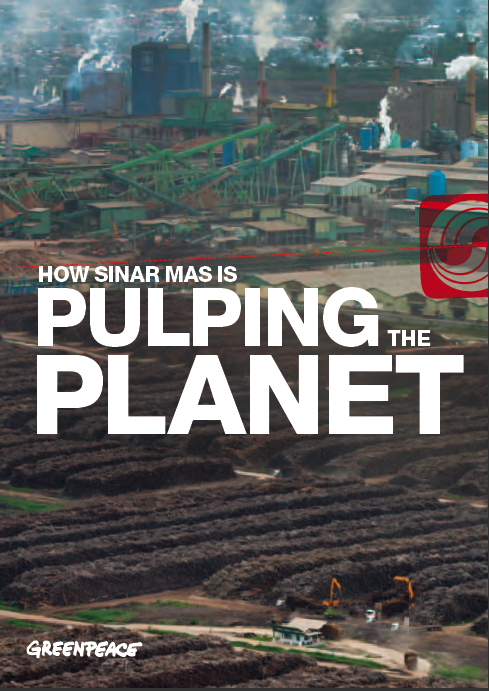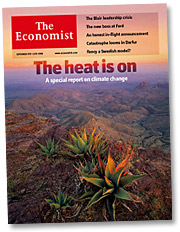 This week, Greenpeace released a new report “How Sinar Mas Is Pulping the Planet.” The conclusions were highly critical of Asia Pulp & Paper, one of the largest vertically integrated pulp and paper companies in the world.
This week, Greenpeace released a new report “How Sinar Mas Is Pulping the Planet.” The conclusions were highly critical of Asia Pulp & Paper, one of the largest vertically integrated pulp and paper companies in the world.
According to Greenpeace, APP is gobbling up tropical forest for fiber production, lying about its intentions to scale back production in extremely sensitive areas such as peatlands, and putting endangered species like the Sumatran Tiger at risk.
Pulping the Planet reveals – from analysis of Indonesian government and confidential Sinar Mas maps and data, as well as on-the-ground investigations – that APP continues to acquire and destroy rainforest and peatland to feed its two pulp mills in Sumatra.
Them’s fightin’ words.
APP, normally reticent to respond to critics in public, is fighting back. Today it released a press release calling Greenpeace’s accusations “false,” “misleading,” and “salacious.”
In a statement from its PR firm:
While Greenpeace has not accused APP of doing anything illegal, the organization’s claims in the report are false and misleading, continuing Greenpeace’s tradition of inaccurate and alarmist reporting. By publishing this report, with its salacious claims and deceptive allegations regarding the policies of the Indonesian government and the development of its industries, Greenpeace has undermined efforts toward sustainable development in Indonesia – a vitally important undertaking.
I’ve skimmed the Greenpeace report. I’ve read APP’s response, which includes data that undermines and contradicts some of the Greenpeace report. I must say it’s confusing.
- Greenpeace claims to have secret documents obtained from Sinar Mas that point to a secret plan by APP to increase its current pulping capacity by up to seven times. APP responds by saying that Indonesia’s regulations require transparency for such expansion plans to be approved and supported by different levels in the provincial and central governments. “Additionally, Greenpeace’s allegation is illogical since roughly 20 million acres of gross pulpwood concession area would be needed to achieve the purported increase in production, yet currently in Indonesia, there is only 14 million acres of land allocated for such plantations.”
- Greenpeace accuses APP of compromising the habitat of endangered animals such as the Sumatran Tiger. APP categorically states that this is not the case. “APP has set aside 261,930 acres of production forest to serve as the core of the Senepis Sumatran Tiger Sanctuary in the Riau province, a pioneering initiative that is a vital contribution to the survival of this species.”
It’s no wonder that APP is responding. Some international companies, such as Staples, Office Depot, and Woolworths (Australia), are reported to have have stopped buying or selling paper products connected to APP. Those are big numbers.
Do I believe that huge global companies walk in a very gray area when it comes to profit and true sustainability? Sure. Everyone wants to be seen as green, but the truth is, on a global scale, it conflicts with profitability. On the other hand, environmental groups tend to walk on the edge, too, amplifying and twisting facts to suit their own agendas. The end justifies the means kind of thing.
What’s the truth in this case? I have no idea. Readers will have to download the report and the press release and try to figure it out. I just wish everyone involved in the world of sustainability would follow the lead of our court system, which asks people to tell “the truth, the whole truth, and nothing but the truth.”
It would make things much easier.






check out on YouTube the latest action of Greenpeace Belgium during the International Pulp and Paper Awards (against destruction of the Indonesian rainforest): http://www.youtube.com/watch?v=h9I_nRWKZJM&feature=player_embedded
The GOLDEN CHAINSAW goooooees to…… great job from Greenpeace!
Stop the gangster-economie. No respect for nature en humans
Great post! Readers will definitely need to put more time into this if they truly care. Additionally, when it comes to Indonesia–one of the more corrupt countries in the world–, one would also need to factor in potential bureaucratic involvements. Presumably, the fact that APP protested by stating “salacious claims and deceptive allegations regarding the policies of the
Indonesian government and the development of its industries” could only mean two things. While it may be unfair to even consider the fact that there are anomalies does not mean i should not be considered. They are quite notorious for it anyway.